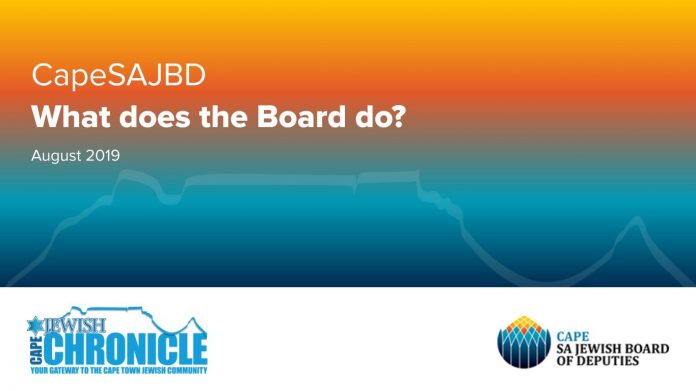Some of those questioned in the Communal Survey being conducted by the Kaplan Centre have said that they do not know what the Board does.
Since its establishment 115 years ago, the Board’s communal roles expanded to confront new challenges. Here we try to answer the question chronologically by explaining the Board’s role in establishing projects that now run independently.
The Cape Board now
Antisemitism: Monitoring antisemitism in the media and society and taking appropriate action.
Cultural: Enriching and maintaining Jewish life through cultural and educational programmes, including the Yom HaShoah commemoration, publications, exhibitions and academic seminars.
Information Resource: Providing information on Jewish life and history, locally and internationally.
Interfaith: Working on interfaith by building connections with other faith communities.
Political: Networking with government at every level in order to maintain open lines of communication between local and provincial government and our community.
Outreach: Coordinating social welfare projects on behalf of the wider society, particularly in times of national emergency.
Holocaust compensation: Keeping abreast of Holocaust-based claims and litigation and making this information available to Holocaust survivors and heirs in the community.
Bursaries: Administering bursaries for tertiary education to students living in the Western Cape in need of financial assistance
The history of the Cape Board
Sheltered Employment: After the Second World War demobbed soldiers had difficulties finding work so the Board set up an employment office as well as sheltered employment for disabled soldiers or community members with learning disabilities or mental problems. This moved into a room in the Astra hostel run by the Union of Jewish Women for young women from country communities. When times changed the need for such a hostel diminished and the UJW rented more rooms to the workshop. This became Glendale, and the world-renowned Jewish Sheltered Employment Agency, now called Astra.
Holocaust compensation: Through DR Erwin Spiro, the Board successfully took on the struggle to obtain compensation for its Holocaust survivors.
Education: In 1949 Board Chairman MH Goldschmidt expressed the Board’s strong views on the necessity of having a Jewish High School, and he turned the first sods for the Herzlia School.
Cultural pursuits: The Board set up a library sub-committee under the formidable Minna Levitas to establish a Jewish library and joined forces with the SAZF that was looking for a way to honour its long time secretary, hence the Jacob Gitlin Library. In 1958, the Board helped set up the Jewish Museum with a grant of £250 and a loan of £250 — now it is incorporated into the SA Jewish Museum.
Fundraising: The Board, along with the UCF persuaded 64 organisations to agree to form a Priorities Board, and also developed a Communal Register. It also put together a committee to pool Bursary Funds and distribute them, and appointed a full time officer to their employment department.
Employment: In 1979 when a depression resulted in a spate of retrenchments, that department was resuscitated and today Staff Wise is professionally recognised for its outstanding results.
Social Services: Under Board leadership, welfare organisations like the Jewish Board of Guardians and Jewish Sick Relief that had overlapping functions and clients united as Jewish Community Services.
Security: Confronted by increasing concerns about security, the Jewish Self Protection Association JASPA came under the aegis of the Board. This developed in 1997 with a full time head into Community Security Organisation to protect Jewish life and the Jewish way of life.
Civil society: The Board has not only assisted in filling gaps within our community, it has also assisted in developing outreach organisations. Afrika Tikkun started out, like Astra, in the Board’s offices. Another recent success is the Mensch Network.
To read the full PDF of the Cape Jewish Chronicle, click here
To read the editor’s column for August, click here
To read our most popular story for July, click here











